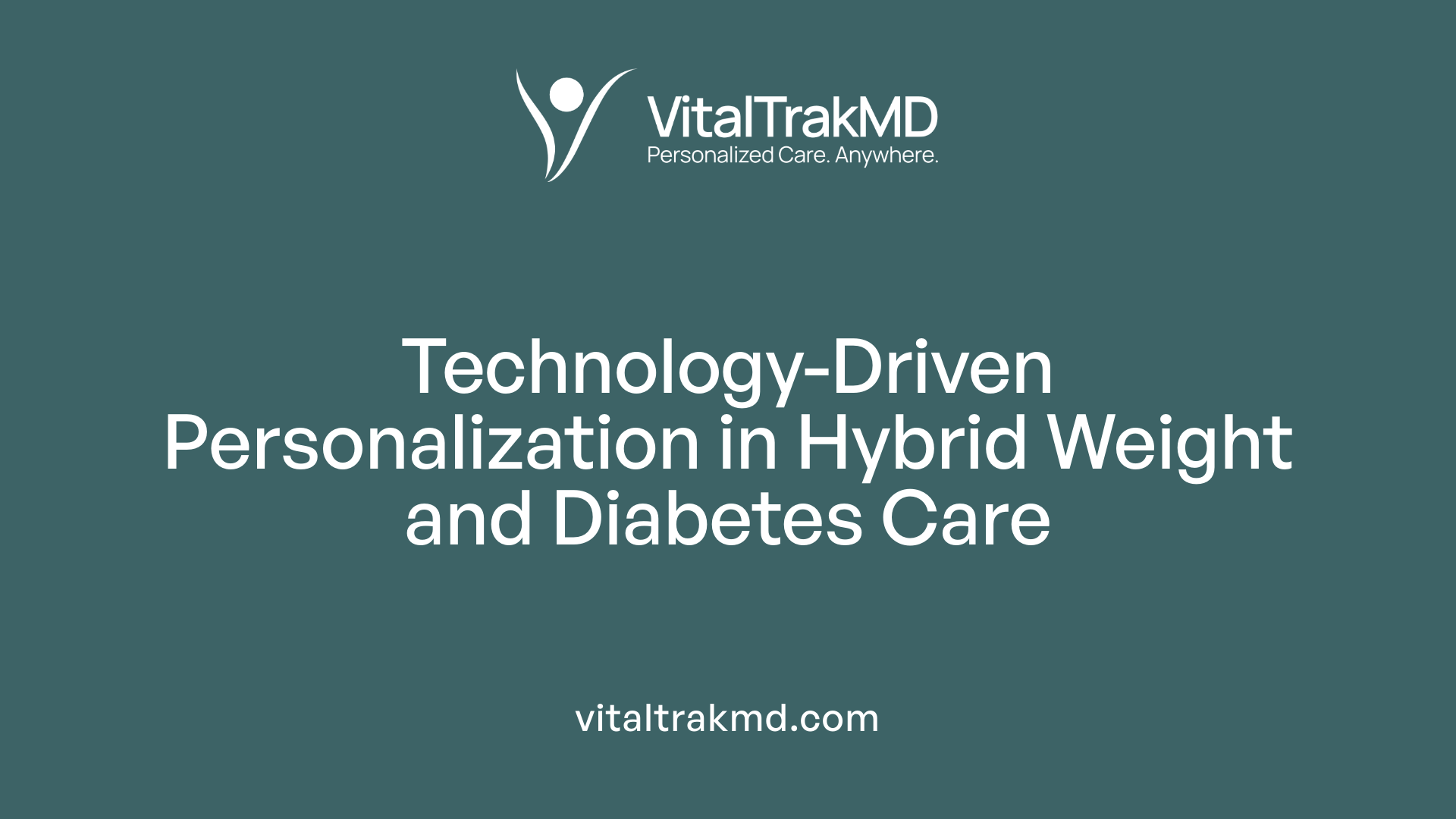How Hybrid Healthcare Encourages Adults to Maintain a Healthy Lifestyle Long-Term

Embracing Hybrid Healthcare for Lasting Lifestyle Changes
As adults strive to maintain a healthy lifestyle over the long term, health programs must evolve to meet their changing needs. Hybrid healthcare—combining the best of in-person and virtual care—has emerged as an effective approach in supporting weight loss, diabetes management, and sustained wellness. This article explores how hybrid models enhance accessibility, accountability, and personalized care to help adults embrace lasting lifestyle changes.
The Evolution of Intensive Lifestyle Interventions for Weight and Diabetes Management

What is the Why WAIT program and its significance in weight management?
The Why WAIT program is a 12-week intensive lifestyle intervention specifically designed for adults battling both diabetes and obesity. This multidisciplinary approach brings together medical professionals, dietitians, and exercise specialists to offer a comprehensive program that addresses weight loss and glycemic control simultaneously.
Description of the Why WAIT program
This program involves personalized lifestyle changes including dietary modifications, physical activity enhancement, medication adjustments, and behavioral support. It is tailored to each participant's needs, promoting sustainable habits rather than quick fixes.
Long-term benefits of intensive lifestyle interventions (ILI)
One of the standout features of the Why WAIT program is its demonstrated ability to help participants maintain weight loss for as long as 10 years post-intervention. This long-term success underscores the program’s effectiveness in fostering lasting lifestyle improvements that positively impact diabetes management.
Duration and multidisciplinary approach
Spanning 12 weeks, the program emphasizes consistent support and education from a multidisciplinary team. This team-based strategy ensures holistic care, addressing multiple facets of health simultaneously to optimize outcomes in weight and diabetes control.
Virtual Models: Continuity of Care During the COVID-19 Pandemic

How effective was the virtual model of the Why WAIT program during COVID-19?
The Why WAIT program, originally an in-person 12-week intensive lifestyle intervention, successfully transitioned to a virtual model amid the COVID-19 pandemic. Despite the shift from face-to-face sessions to online delivery, the virtual program maintained its effectiveness, achieving comparable reductions in body weight and improvements in glycemic control as the traditional in-person approach.
Participants engaging in the virtual Why WAIT program experienced significant weight loss and better management of blood glucose levels, sustaining the program's long-established outcomes. This success was partly due to leveraging mobile apps, continuous glucose monitoring (CGM) data, and frequent medication adjustments remotely, which helped ensure patient accountability and precise health monitoring.
Adapting to telehealth enabled uninterrupted diabetes and obesity care during periods of social distancing. The adoption of virtual platforms not only preserved clinical effectiveness but also introduced greater accessibility and convenience for participants. This shift underlines the potential for telehealth in structured lifestyle interventions, confirming that high-quality care and long-term benefits remain possible without in-person visits.
The virtual program’s ability to closely mirror the outcomes of its in-person predecessor proves that digital health solutions can support chronic disease management efficiently, even in challenging times like a global pandemic.
Introducing the Hybrid Healthcare Model: Combining Best Practices

What is the hybrid healthcare model?
The hybrid healthcare model combines in-person and virtual components to deliver comprehensive care. It integrates the benefits of face-to-face interactions with the convenience of remote support, making it especially suitable for chronic conditions like diabetes and obesity.
How effective are hybrid approaches?
Studies involving 18 participants showed an average weight loss of 8.2 kg, roughly 8% of their body weight, alongside an A1C reduction of 0.6%. These results were similar to those seen with fully in-person or fully virtual models over 12 weeks.
How does the hybrid model compare to other delivery methods?
All three approaches—in-person, virtual, and hybrid—demonstrated significant improvements in weight and glycemic control with no notable differences between them. This indicates that hybrid care is as effective as other delivery formats.
What benefits does the hybrid healthcare model offer for adults managing weight and diabetes?
The hybrid model offers increased flexibility, allowing patients to engage through various platforms that fit their schedules and preferences. It enhances scalability and accountability through tools like mobile apps for tracking, continuous glucose monitoring (CGM) data, and frequent medication adjustments. These features help maintain engagement and optimize health outcomes, making hybrid care particularly valuable in a healthcare landscape increasingly focused on telehealth solutions post-COVID-19.
Leveraging Technology for Personalized and Effective Care

How do technology tools enhance the effectiveness of hybrid healthcare?
Technology plays a crucial role in increasing the effectiveness of hybrid healthcare models, particularly in lifestyle interventions for diabetes and obesity management. Mobile applications enable home-based tracking of weight, diet, and physical activity, allowing participants to monitor their progress conveniently and in real time from their own environment. This continuous tracking fosters accountability and motivation.
Integrating continuous glucose monitoring (CGM) data into these digital platforms permits both patients and healthcare providers to observe blood glucose trends closely. This real-time data sharing aids in aligning lifestyle changes with immediate physiological feedback, empowering personalized adjustments.
Moreover, frequent medication adjustments can be conducted remotely based on the data received. This ensures timely optimization of treatment without requiring in-person clinic visits, enhancing patient safety and outcomes. The ability to continuously monitor and promptly respond to health indicators through technology allows hybrid care to maintain the efficacy of in-person programs while offering greater flexibility and accessibility.
Overall, mobile apps, CGM integration, and remote medication management form an interconnected system that supports sustained health improvements in hybrid healthcare, making these interventions more patient-centered and adaptable in today’s telehealth-focused landscape.
Flexibility, Scalability, and Accountability in Hybrid Healthcare
Increased Patient Flexibility Through Hybrid Delivery
The hybrid healthcare model combines in-person visits with virtual care, offering patients greater flexibility in managing their treatment schedules. This approach allows individuals to choose the setting that best fits their lifestyle and needs, reducing barriers such as travel time or scheduling conflicts. For programs like Why WAIT, this means participants can maintain consistent engagement without compromising convenience.
Scalability of Hybrid Models Post-Pandemic
Post-COVID, healthcare systems are adopting hybrid models because they can be scaled to serve more patients efficiently. Virtual components reduce the need for physical space and allow clinicians to leverage technology for monitoring and coaching remotely. This model supports broader access to care, reaching patients who might otherwise face challenges attending onsite sessions.
Enhanced Accountability Via Blended Care
Hybrid healthcare fosters accountability by combining the personalized attention of in-person visits with the continuous support of virtual monitoring tools, such as mobile apps and continuous glucose monitoring (CGM) data. Regular medication adjustments and lifestyle coaching through telehealth encourage adherence to intervention protocols, which is crucial for sustaining long-term health improvements.
Why is the hybrid healthcare model particularly suitable for the post-COVID era?
The hybrid model offers increased flexibility by allowing patients to access care both in-person and virtually. Its scalable nature enables broader reach and resource efficiency, especially in a healthcare landscape prioritizing telehealth. Additionally, hybrid care reinforces patient accountability, which is vital for long-term lifestyle maintenance. These combined benefits make hybrid models a fitting solution for ongoing chronic condition management in the evolving healthcare environment.
Supporting Bariatric Surgery Patients with Virtual Health Coaching
Implementation of virtual coaching after sleeve gastrectomy
A virtual health coaching program was launched specifically for patients following sleeve gastrectomy. This program provides essential support through telehealth, allowing patients to engage with certified health coaches remotely, which increases accessibility and convenience compared to traditional in-person care.
Frequency and structure of coaching sessions
The coaching sessions are structured with varying frequencies: weekly, bi-weekly, and monthly. This flexible schedule is designed to align with different stages of recovery and personal needs over time, ensuring patients continuously receive tailored guidance and motivation.
Focus on goal progression and lifestyle adherence
Central to the program is monitoring patients' goal progress and reinforcing adherence to post-surgical nutritional and physical activity guidelines. Personalized lifestyle support emphasizes sustainable habits that contribute to long-term success after surgery.
How does virtual health coaching aid patients after bariatric surgery?
Virtual health coaching helps patients track their weight loss journey and lifestyle changes, providing real-time feedback and support. This sustained engagement is crucial for maintaining positive health behaviors and has been associated with significant weight reductions, such as a decrease from an average of 271 lbs to 227 lbs over six months. It also reduces patient burden and offers a cost-effective alternative to in-person support. Overall, virtual coaching enhances long-term postoperative weight management by bridging gaps in traditional care and encouraging consistent patient participation.
Sustained Weight Loss Through Continued Virtual Engagement
What weight loss outcomes were observed with virtual coaching after bariatric surgery?
Participants in a virtual health coaching lifestyle program following sleeve gastrectomy experienced substantial weight loss over a 6-month period. The average weight decreased from approximately 271 lbs to 227 lbs, marking a significant reduction. This outcome showcases the effectiveness of virtual support in promoting positive weight changes.
Significance of repeated measures analyses
Repeated measures analysis conducted in the study demonstrated significant weight reduction at every recorded time point during the 6 months. The largest difference was noted between the initial and current weight measurements, underscoring that consistent virtual coaching contributes not just to initial weight loss but also to ongoing progress.
Role of sustained digital support in weight management
Virtual health coaching provided regular sessions on a weekly, bi-weekly, and monthly basis with certified health coaches. These sessions focused on monitoring goal progress, personalized lifestyle advice, and adherence to post-surgical nutrition and physical activity guidelines. This sustained digital support offers increased accessibility and reduced burden compared to traditional in-person care, ensuring accountability and ongoing encouragement necessary for long-term weight management success after bariatric surgery.
Advantages of Virtual Healthcare in Long-Term Wellness
What are the main advantages of virtual healthcare compared to traditional methods?
Virtual healthcare provides several notable benefits over traditional in-person support, especially in managing chronic conditions such as diabetes and obesity. One of the primary advantages is increased accessibility. Patients can participate in programs like the Why WAIT hybrid or fully virtual models from their homes, eliminating travel challenges and scheduling conflicts that often hinder in-person visits.
This increased accessibility extends particularly to individuals with mobility issues, busy schedules, or those living in remote areas. It significantly broadens the reach of healthcare interventions, encouraging consistent engagement and timely follow-up.
Additionally, virtual models reduce patient burden by minimizing the time and logistical effort required to attend appointments. This ease of access helps patients adhere more consistently to lifestyle interventions and follow-up visits, which are critical to sustaining long-term weight loss and glycemic control.
From a cost perspective, virtual healthcare tends to be more affordable. It decreases overhead costs for clinics and reduces expenses associated with transportation and time off work for patients. This cost-effectiveness makes virtual programs a highly scalable option for broader populations without compromising the quality of care.
Compared to traditional in-person support, virtual health coaching and hybrid intervention models have demonstrated similar effectiveness in weight reduction and glycemic improvements. By leveraging mobile tracking apps, continuous glucose monitoring data, and frequent medication adjustments remotely, virtual programs maintain clinical rigor while offering greater flexibility.
Overall, virtual healthcare's ability to enhance accessibility, reduce patient burden, and provide cost-efficient support makes it a powerful tool in facilitating lasting lifestyle changes and long-term wellness in the evolving landscape of healthcare delivery.
The Critical Role of Ongoing Support in Weight Management Success

Why is ongoing postoperative support vital for maintaining weight loss?
Maintaining weight loss after intervention, especially following bariatric surgery, presents a significant challenge. Continued postoperative support plays a crucial role in helping individuals sustain their progress over time. This support is vital because it reinforces healthy lifestyle habits, provides accountability, and helps patients navigate obstacles that may lead to weight regain.
Virtual coaching as a long-term support tool
Virtual health coaching programs have emerged as an effective long-term aid for patients following bariatric surgery. These programs offer regular telehealth sessions—ranging from weekly to monthly—that focus on goal monitoring, personalized lifestyle guidance, and adherence to nutritional and physical activity recommendations. The virtual format improves accessibility, lowers patient burden, and reduces costs compared to traditional in-person methods.
Impact on sustained healthy behaviors
The structured and ongoing nature of virtual coaching encourages sustained positive behaviors by providing consistent encouragement and tailored advice. Studies show significant and continuous weight loss among participants engaged in these remote support programs, illustrating their potential to maintain healthy habits and prevent relapse over extended periods.
The integration of virtual postoperative support ensures patients receive the attention and motivation needed to achieve long-term success in weight management following surgery or intensive lifestyle interventions.
Future Directions: Scaling Hybrid Healthcare to Broader Populations
How might hybrid healthcare evolve to benefit more adults aiming for long-term health?
Hybrid healthcare models, blending in-person and virtual approaches, show promising potential for widespread application among adults managing chronic conditions like diabetes and obesity. The success of programs such as the hybrid Why WAIT model and virtual health coaching after bariatric surgery demonstrates their ability to deliver significant weight loss and improved glycemic control with increased flexibility and scalability.
Integrating new technologies will be a major driver in expanding hybrid healthcare. Advances such as AI-driven personalized coaching, enhanced mobile app tracking, continuous glucose monitoring (CGM), and real-time data analysis can optimize patient engagement and treatment adjustments remotely. These tools enable more tailored interventions and timely medication management, supporting sustained health benefits.
Despite these opportunities, several challenges remain for broader implementation. Ensuring equitable access to digital resources and overcoming disparities in technology literacy are crucial considerations. Maintaining patient motivation and adherence in less supervised virtual environments requires innovative engagement strategies. Additionally, healthcare systems need to adapt workflows and reimbursement models to support hybrid care sustainably.
Overall, scaling hybrid healthcare effectively will involve balancing technology integration with personalized support, while addressing access and engagement barriers to benefit a diverse adult population striving for long-term health.
Harnessing Hybrid Healthcare for Lifelong Wellness
The rise of hybrid healthcare models marks a transformative shift in supporting adults to maintain healthy lifestyles long-term. By combining the personalized touch of in-person care with the convenience and flexibility of virtual interventions, hybrid approaches enhance accessibility, accountability, and sustained engagement. Programs like the Why WAIT initiative demonstrate that intensive lifestyle interventions, supplemented by technology and continuous support, can lead to significant and lasting weight loss and glycemic improvements. As healthcare continues to blend digital and face-to-face strategies, hybrid care stands poised to empower more individuals on their journey to lifelong wellness.
References
Recent articles
Want to Feel Better and Live Healthier?
Join hundreds of patients taking control of their health with personalized care that fits their life – not the other way around.
Rated 4.8/5 by 32+ customers







